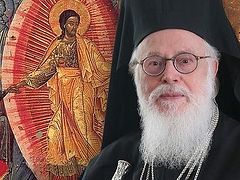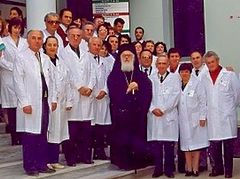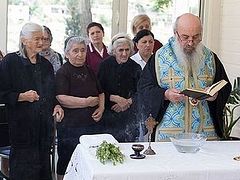Tirana is a complex city. Like many other southern cities, it is characterized by diversity of colors. Southern bounty can be best seen in the city streets—tangerines are sold on branches with leaves, and even vegetables and fruit look fresher and juicier than those in the north. Street traders roast sweet corn amateurishly so that some of corn ears are almost burned, while others are just lightly roasted. Roads are busy and noisy, traffic rules are not always observed, and drivers let pedestrians cross once in a great while. Judging by the clothes of local residents and “free” advertising posters, Tirana is a very secular city—a logical legacy of the totalitarian Communist regime which once proudly announced the eradication of religion in this small Balkan country.
I was at a academic conference in Albania and spent only three days there. Unfortunately, I didn’t manage to travel outside the capital over that time. On the second day of my visit I was received by Archbishop Anastasios (Yannoulatos), the primate of the Albanian Orthodox Church. His Beatitude is approaching his ninetieth year, but he is still quite fit despite his advanced age and his intelligence and capacity for work can only be admired. It was Archbishop Anastasios (a Greek by birth who worked at University of Athens for many years) that took the labors for the restoration of the Church in Albania upon himself. Thirty years ago almost all the churches in Albania were closed, and there were just over twenty priests in the country, nearly half of whom couldn’t serve due to their old age or illnesses. Of course, the atmosphere of desolation, which is characteristic of all post-Communist countries, reigned there: ruined or dilapidated churches, used “to serve the people’s economy” as storehouses, stable blocks, and sometimes (under favorable circumstances) as cultural centers. Archbishop Anastasios assumed authority over a Local Church which had been virtually destroyed and lay in ruins. Now, thirty years later, he is the head of a Local Church that has as many as 400 parishes and around 160 clerics.
I talked with Archbishop Anastasios for more than an hour. However, I had been warned beforehand that no part of our conversation should be published in the press or on the internet. I can only say that we discussed the situation in Ukraine extensively, and my report at the international conference in Tirana was dedicated precisely to the religious issues in Ukraine (later I gave the text of this paper to His Beatitude). The primate asked me questions and I tried to answer them as far as possible, asking him questions in return now and then. His openness, accessibility to people, modesty and erudition, which were especially noticeable during our talk, became for me the archbishop’s best characteristics. This hierarch, who plays an important role in the Orthodox world, a renowned theologian, a brilliant organizer and administrator, showed absolutely no signs of pride or arrogance, which, alas, can often be seen in those holding various positions in Church structures.
At parting, shaking my hands gently, Archbishop Anastasios said that he was happy that the new generation of people was coming to the Church and expressed the hope that they will bring more justice. By the way, at the Liturgy at the cathedral Archbishop Anastasios gave Communion to the parishioners unaided, without any guard or invitation tickets.
Bishop Astios: “Most of our parishioners are Albanians”
 With Bishop Astios (Bakalbashi)
With Bishop Astios (Bakalbashi)
Bishop Astios (Bakalbashi) is one of the youngest hierarchs of the Albanian Orthodox Church (he was consecrated in 2012). An Albanian by birth, he is a Vicar Bishop of the Diocese of Tirana. I had an opportunity to talk with him at his office in the Archdiocesan Headquarters after my meeting with Archbishop Anastasios. The rate of our conversation was slow, but we did touch upon the most burning issues of the day, including national and ethnic issues.
“Most of our Orthodox believers are Albanians,” Bishop Astios said. “There are also representatives of ethnic minorities—for example, Serbs and Montenegrins. An overwhelming majority of our clergy are ethnic Albanians.”
While listening to Bishop Astios, I was thinking that in political terms Albania has always supported the Kosovar separatists, which accounts for the strained relations between Tirana and Belgrade. Meanwhile, Serbia is an Orthodox country. So I wondered if Albanians regarded Orthodoxy as a “foreign” faith, “the faith of Serbs” and, therefore, “the faith of our opponents and enemies”.
“Our Local Orthodox Church is Albanian,” Bishop Astios noted. “We always speak about this, and the Albanians understand this very well. True, there are some difficulties in the relations between our states (and some of our politicians have voiced this), but it is a matter of interstate contradictions and not our attitude towards the Church.”
“At the same time, Albania remains a predominantly Muslim country, though before the Ottoman invasion these lands were inhabited mainly by Christians. Are Albanians ready to return to their Christian roots today?” I wondered.
“We have many converts from Islam to Orthodoxy for various reasons. People come to us and listen; and they like what they see and hear here. Some of them come to realize that their remote ancestors were Christians and this factor influences their choice too. We have no program of work with Muslims, though—we just try to be open to all,” The bishop answered.
 The Cathedral of the Resurrection of Christ in Tirana
The Cathedral of the Resurrection of Christ in Tirana
“But how does Albanian society treat those who convert from Islam to Orthodox Christianity?”
“As far as I know, these people don’t encounter particular problems here. In any case, the situation in Albania is different from those in a number of Arab countries. All in all, we maintain good interfaith relations.”
There was one more question that I couldn’t pass over in silence, namely the question of money and property. I asked His Eminence how their parishes manage to keep going; who pays salaries to priests; and whether the state gives back the churches and monasteries that were previously confiscated.
“The financing is a matter for our Archbishop Anastasios himself to decide. Through his contacts he finds the funds that we need. We don’t receive any financial support from the state; more than that, we haven’t got the previously confiscated property back yet. True, we are allowed to worship in the churches which are publicly owned. But some of them were converted to museums, which are visited by tourists who may even enter the sanctuaries and touch the altars. We are allowed to serve in such ‘church museums’ on rare occasions, several times a year at most.”
At the end of our conversation I asked Bishop Astios about his view on the current crisis in Ukraine. His answer was very diplomatic, with no appraisal or details whatsoever:
“We are following the developments in Ukraine but, in our opinion, it is a matter of a conflict among Russian people. We don’t interfere and suppose that Moscow and Constantinople must find the best solution.”
 At the Liturgy at the Cathedral of the Resurrection of Christ
At the Liturgy at the Cathedral of the Resurrection of Christ
“Do you think that it is the actions of Constantinople that have triggered the current problems in Ukraine?” I asked.
“I have already stated my view. At present we cannot judge who is right and who is wrong.”1
The next day I attended the Vespers at the Cathedral of the Resurrection of Christ. The service was held in Albanian. After the Vespers I talked with a local priest, Fr. Gregory Pelushi. An ethnic Albanian, he is a former Muslim who converted to Orthodoxy.
Priest Gregory: “I realized that the Bible is for me”
Fr. Gregory has served as a priest since 2014. He was born to a Muslim family in the south of Albania. He never was a practicing Muslim, though. From his school days he tried to find the answers to essential questions related to the purpose of life and became acquainted with Orthodoxy. Of course, it took him time to embrace Christianity, but it was a conscious step of a person who understood his choice.
“First I studied the Koran and then set about studying the Bible,” the priest related. “It turned out that the Bible was easy for me to understand; I found myself on every page of it. I realized that the Bible is for me. Unfortunately, some of my relatives strongly disapproved of my decision to become a Christian, but my parents encouraged me. My parents’ support was extremely important to me. Glory be to God, afterwards they were baptized as well.”
“But, as you have mentioned, you couldn’t avoid problems with your relatives…”
“That is so. But, at the same time, our Muslims are different from those in Chechnya or Dagestan. After all, Christian blood has flown in our veins since the earliest times. The ancestors of many of us had been Christians till the late eighteenth century. They may have remained Christians deep in their hearts, though they defected to another faith under pressure and threats. These people suffered much during the Ottoman occupation.”
“Do you assume that Albanian Islam’s radicalization is impossible?” I wondered.
“We should be prepared for this radicalization, all the more so because our young people may follow the negative examples that we have seen among the Muslims in the UK, France, Germany, and other European countries. Unfortunately, some Albanians go to these countries, associate with local Muslims and later are found to be contaminated by the ideas of Islamism.”
“Perhaps the Orthodox Church might organize a mission among Muslims? For instance, you could write an article on your conversion to Orthodoxy. It would be a good missionary move.”
“I have been thinking about it, but now it is not the time to do this,” Fr. Gregory said. “First let us allow Muslims (those who wish to do so) just come to our church. Over the past three years I have baptized 500 people, and about seventy-five percent were Muslims. They sincerely love Christianity despite the attempts by nationalists to create a negative image of the Church. Nationalists assert that Orthodox are Greeks, while Albanians must be Muslims.”
 Priest Gregory Pelushi “Yes, I heard the opinion about the alleged Greek dominance in the Albanian Orthodox Church…”
Priest Gregory Pelushi “Yes, I heard the opinion about the alleged Greek dominance in the Albanian Orthodox Church…”
“The people who are talking of this don’t belong to the Church and don’t know the Church. I am being accused of ‘not being a patriot’ and ‘serving in Greek’. How dare they say such things?! I serve in Albanian and many members of my family suffered from the Communist regime. These accusers are probably not very honest. I don’t rule out the possibility that they are paid for the dissemination of false accusations. I often appear in the mass media and try to explain all these things. It’s a pity that few of our priests work with the media. In my judgment, they are wrong to refuse from this cooperation. After all, we speak on TV and radio and deal with the press in order to proclaim the truth of the Orthodox faith and not to become media stars.”
“I agree: that is of vital importance to any society, not the least a secular one, because in such a society children and the rising generation can easily adopt ideas that are far from Christian…”
“Yes, but a personal example is crucial here,” the priest said. “I believe that the determining factor is the family a child lives in rather than the environment. If children see that their parents are honest and sincere, as befits Christians, they will most likely follow their parents’ example and not the world around them. A personal example at the family level plays a crucial role here.”
In conclusion Fr. Gregory said that in general the Albanian Government tries to pursue a carefully thought-out policy towards religion without giving preference to one or another religious group. According to him, during the visit of Patriarch Kirill to Albania in April 2018 both the media and the powers that be seemed to be favorably disposed towards him. To all appearances, official Tirana is well aware of the danger that a potential interfaith conflict presents in this unstable region and thus tries to resist the pressure from more radical groups, in spite of the fact that these groups sometimes receive a powerful backing both inside and outside this country.





Thank you and God bless.